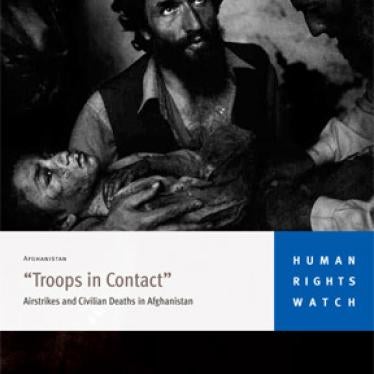(New York) - The United States should make protecting human rights a priority in its revised policy toward Afghanistan, Human Rights Watch said today in a letter to President Barack Obama.
"The Obama administration deserves credit for showing its commitment to Afghanistan with its public statements, appointment of a special representative, and policy reviews," said Brad Adams, Asia director at Human Rights Watch. "We hope that this will produce a fundamental rethinking of US military, political, and humanitarian policies in Afghanistan."
The Human Rights Watch letter to Obama outlines a number of steps needed to improve the climate for human rights in Afghanistan. They include improving everyday security for civilians, combating warlordism, pursuing justice for past crimes, strengthening women's rights, protecting freedom of expression, sidelining rights abusers in upcoming elections, and reforming the judiciary.
Human Rights Watch urged the US to promote needed reform of Afghanistan's security agency, the National Directorate of Security (NDS), and to reconsider its support for tribal militia. Human Rights Watch also stressed the need for the United States to alter its military policies to minimize civilian casualties, review the practice of "night raids" on homes, and bring its detention policy at the Bagram prison into conformity with international law to protect detainees' rights.
Human Rights Watch said that the Bush administration expressed many bold aspirations, but that the fight against the Taliban and al-Qaeda was placed high above other key goals, including human rights, the rule of law, and good governance. To fight the Taliban and al-Qaeda, many warlords were placed in positions of authority, relied on for military support, and provided weapons and funds by the US. The US is still maintaining some of these relationships, and has shown little appetite for sidelining senior warlords when the opportunity has arisen.
"The growth of the insurgency in Afghanistan cannot be understood outside the prism of lawlessness, rights abuses, and corruption under which so many Afghans live," said Adams. "The United States has been complicit in the resurgence of warlordism in Afghanistan. It is time for the US to lead by example and break all links to past and present criminals, and press the Afghan government to do the same."
The plight of women under the Taliban was cited as a major reason for overthrowing the Taliban government in 2001. However, far too little real progress has been made in delivering women their basic rights.
"Though some improvements have been made, Afghan women and girls still face huge gaps in health and education and face routine violence and discrimination," said Adams. "The United States should reinvigorate discussions with the Afghan government and civil society and make the promotion of women's rights a key plank of its new policy."
Human Rights Watch also called for a shift of emphasis in US military strategy. While the US is deploying more troops to Afghanistan to fight the Taliban and al-Qaeda, greater attention is needed to provide basic security for Afghans in both conflict and non-conflict areas.
Human Rights Watch is concerned by US support for the latest experiment in using tribal militia, the Afghan Public Protection Force. The failures of previous national and international attempts to gain the support of Afghanistan's tribes are well documented. Most efforts have been exploited by local politicians and other actors, exacerbating tribal discord and increasing the black market in weapons. The current pilot project already appears to be repeating past mistakes.
"We do not underestimate the challenges faced in Afghanistan, but better policies can make a significant difference in the lives of Afghans," said Adams. "It is essential for the US, as the most important external power in Afghanistan, to get its new policy right."







